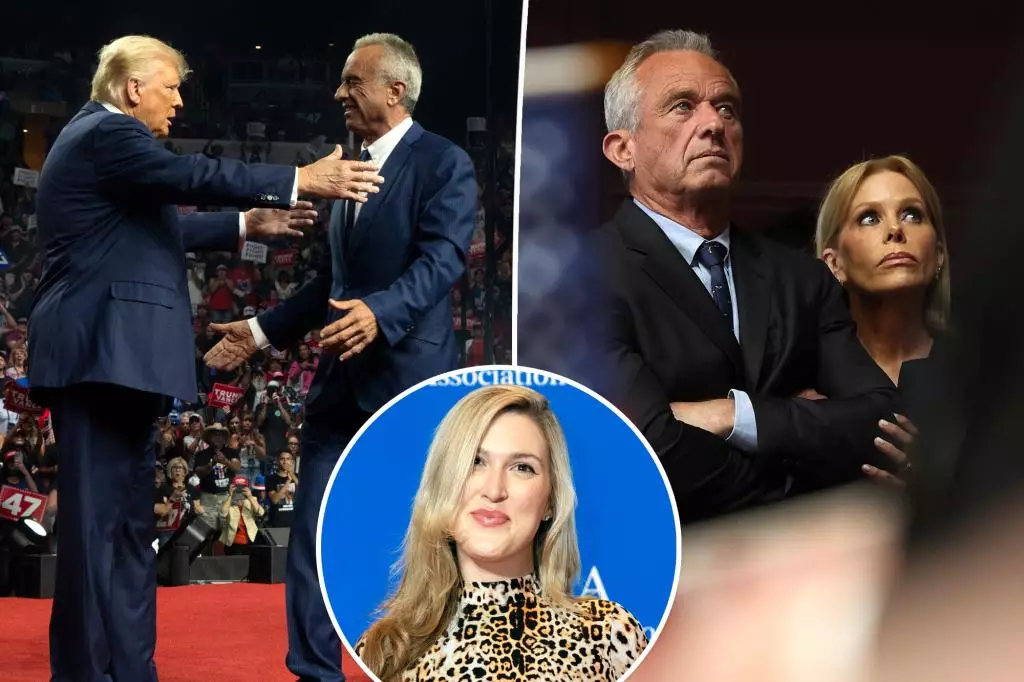In the ever-evolving landscape of American politics, few topics draw as much intrigue as personal scandals involving political figures. Recent revelations about Robert F. Kennedy Jr., particularly his relationship with journalist Olivia Nuzzi, have ignited intense speculation about his potential future in the Trump administration, should Donald Trump secure another term in office. The intersection of personal indiscretions and political ambition raises significant questions: In a political climate shaped by changing norms, how do scandals shape careers, and what does it mean for the future of party dynamics?
Kennedy’s alleged romantic entanglements have placed him at the center of a media storm, particularly since it was reported that he maintained a non-physical, albeit salacious, relationship with Nuzzi. This relationship reportedly began after she profiled him, suggesting that the blending of personal and professional boundaries in the political realm continues to blur. The emergence of additional allegations involving three women further muddies the waters, yet Kennedy’s connections may afford him certain insulation in the high-stakes world of political maneuvering, especially if Trump is at the helm.
Despite these allegations, insiders suggest that Kennedy’s prospects in a potential Trump administration remain unscathed. Many in Washington appear to regard this scandal as minor, a temporary distraction rather than a career-ending event. “In D.C., this is barely a scandal,” remarks a political source, highlighting the shift in cultural tolerance regarding personal bankruptcies. The GOP, increasingly focusing on winning elections over maintaining traditional moral standards, seems to approach Kennedy’s situation with indifference, if not outright dismissal.
The Shifting Sands of Political Morality
The evolution of the Republican narrative around personal scandals reflects broader societal changes. Insider opinions imply that contemporary Republican insiders are less inclined to engage in the moral policing that characterized earlier eras. “We are not the party of George W. Bush anymore,” noted one source, commenting on the evolution of partisan identity. This suggests a collective strategic retreat from the notion that personal conduct should play a significant role in one’s political viability.
This pivot in political ethics raises questions about the nature of accountability and the potency of scandals in shaping public sentiment and policy. Scandals, in their traditional sense, were viewed as critical moments that could derail candidacies and destroy careers. However, in today’s political ecology, such issues seem to be quickly normalized or even embraced, provided they do not endanger a candidate’s fundamental alignment with party ideology.
Kennedy’s potential future offers multiple outcomes, depending largely on the political landscape. His endorsement of Trump was viewed as a pragmatic adjustment after abandoning his own presidential aspirations. However, it also invites scrutiny into the motivations behind such endorsements. Critics argue that it may be more about self-preservation than ideological alignment—whether Kennedy is willing to engage in the less savory aspects of political life is still an open question.
Sources speculate that while Kennedy’s affairs may raise security concerns, particularly regarding blackmail, they might not preclude him from significant roles unbound by security clearances. “There are plenty of jobs in the White House without a security clearance,” an insider remarked, referring to roles in health-related sectors, which might align with Kennedy’s public persona and advocacy.
Aside from political repercussions, Kennedy’s marital relationships and his wife Cheryl Hines’ rumored discontent remain another significant dimension to this saga. Reports claim Hines is upset not only about the public allegations but also given Kennedy’s backing of Trump, which may symbolize a deeper ideological rift. The domestic ramifications of political scandals often unraveled so publicly highlight the personal sacrifices of those in power, revealing the human cost of political life.
Kennedy’s history, particularly his documented “lust demons,” echoes the personal struggles that frequently accompany fame and ambition. Such revelations can generate sympathy or disdain depending on public perception and timing, ultimately shaping voters’ opinions based on emotional resonance more than factual accuracy.
The intertwining of Robert F. Kennedy Jr.’s personal life with his political aspirations exemplifies the complexities of ethical expectations within contemporary political culture. As the lines between personal conduct and political capital continue to blur, the future could see an increased normalization of previously disqualifying conduct, moving toward a model where the spotlight is shared equally between personal failings and professional achievements.
Kennedy’s saga, at its core, challenges us to reconsider what truly defines political character. While scandals may once have spelled doom for political careers, they now coexist uneasily with ambition—a reflection of a party and a nation that is continually redefining the standards by which public figures are judged.

